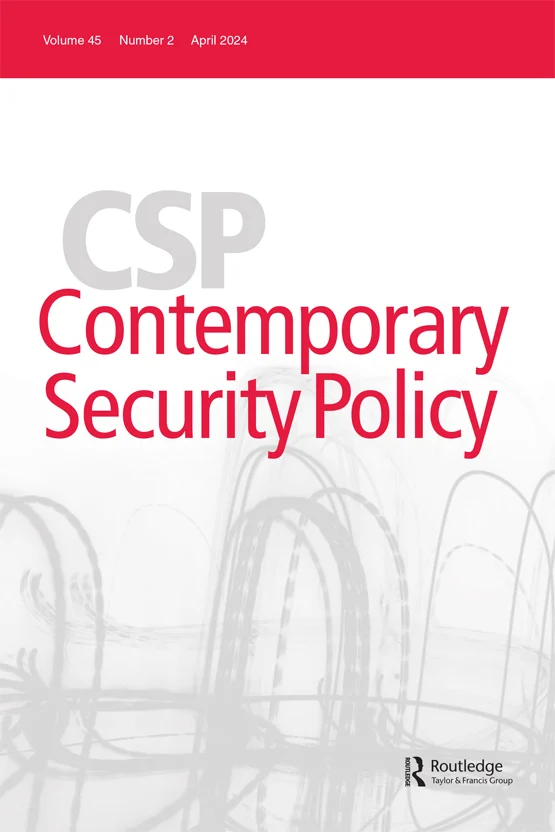职业联系:跨国专家网络与多边网络犯罪谈判
IF 5
1区 社会学
Q1 INTERNATIONAL RELATIONS
引用次数: 0
摘要
摘要欧洲委员会关于网络犯罪的布达佩斯公约(2001年)仍然是网络安全多边治理的一个重要里程碑。这一区域性协议是在二十多年前谈判达成的,如今因其持久的影响、其作为一项具有约束力的网络问题多边协议的罕见性,以及其在塑造关于言论自由和将网络内容定为犯罪的辩论方面的作用,重新获得了重要意义。本文探讨如何解释《公约》几乎完全排除内容犯罪。本文借鉴了为纪念《公约》通过20周年而发表的新文件,包括主席和主要起草者的详细证词,强调了在精通技术和外交经验丰富的谈判代表之间建立长期职业联系的重要性,建立了一个克服分歧和权力不平衡的跨国政策网络。了解《布达佩斯公约》如何解决分歧,有助于了解当前多边网络安全和网络犯罪治理危机的背景,并提供一条远离日益增长的数字威权主义的道路。关键词:网络安全网络犯罪多边主义治理布达佩斯公约专业知识感谢海牙国际网络安全项目特刊的编辑给我机会为本期特刊撰稿,感谢当代安全政策的编辑和审稿人提供的指导和反馈。我还要感谢查塔姆研究所国际安全项目的团队,感谢他们支持我撰写这篇文章,并使我能够作为一个非国家的多方利益相关者组织参与各种网络犯罪论坛。披露声明作者未报告潜在的利益冲突。注1:应该注意的是,不可靠性和过度正面记忆的问题在定性方法中很常见,包括访谈。这样,虽然纪念性材料对解释提出了具体的挑战,但这些挑战与其他方法论路线所面临的挑战是等同的;在每一种情况下,指导原则必须是在解释中纳入对这些因素的批判性分析在这一领域使用的标准术语现在是儿童性虐待材料(CSAM),避免了与成人色情制品的有问题的联系和合并,在许多司法管辖区是合法的虽然许多阿拉伯国家随后通过了国家网络犯罪法,但它们的第一次迭代并未提及《阿拉伯公约》,而且在阿拉伯国家联盟的22个成员国中,只有11个国家批准了该公约(在阿拉伯语原文中更宽松地称为“认证或接受或批准”)(最近一次是2017年的巴林)。本文作者是查塔姆研究所(Chatham House)网络政策高级研究员。他是欧洲网络冲突研究倡议(ECCRI)的联合创始人和受托人,也是海牙国际网络安全项目的非常驻副研究员。他定期发表演讲,并在网络安全和全球政治方面发表了大量文章,包括《中东网络安全政治》(赫斯特/牛津大学出版社,2021年)和《网络空间与不稳定》(主编,爱丁堡大学出版社,2023年)。完整的出版物清单可在https://www.jamesshires.com/research上找到。本文章由计算机程序翻译,如有差异,请以英文原文为准。
Career connections: transnational expert networks and multilateral cybercrime negotiations
ABSTRACTThe Council of Europe’s Budapest Convention on cybercrime (2001) remains a key landmark in multilateral governance on cybersecurity. Negotiated over two decades ago, this regional agreement gains renewed significance today through its enduring impact, its rarity as a binding multilateral agreement on cyber-issues, and its role in shaping the debate on free speech and the criminalization of online content. This article asks how the almost-total exclusion of content crimes from the Convention can be explained. Drawing on new documents published for the twentieth anniversary of the Convention, including detailed testimonials from its chair and principal drafters, the article highlights the importance of long-term career connections among technically-savvy and diplomatically experienced negotiators, creating a transnational policy network that overcame differences and power imbalances. Understanding how the Budapest Convention resolved disagreements helps contextualize current crises in multilateral cybersecurity and cybercrime governance and provides a path away from growing digital authoritarianism.KEYWORDS: CybersecuritycybercrimemultilateralismgovernanceBudapest Conventionexpertise AcknowledgmentsI thank the editors of the special issue at The Hague Program on International Cyber Security for the opportunity to contribute to this issue, and the editors and reviewers at Contemporary Security Policy for their guidance and feedback. I also thank the team of the International Security Programme at Chatham House for their support in writing this article, and for enabling my participation in various cybercrime forums as a non-state multistakeholder organization.Disclosure statementNo potential conflict of interest was reported by the author(s).Notes1 It should be noted that issues of unreliability and unduly positive memory are common across qualitative methods, including interviews. In this way, while commemorative materials pose specific challenges for interpretation, these challenges are equivalent to those faced by other methodological routes; in each case, the guiding principle must be to incorporate critical analysis of such factors into the interpretation.2 Workshop held under the Chatham House Rule on 8 February 2023.3 The standard term used in this area is now child sexual abuse material (CSAM), avoiding problematic associations and conflations with adult pornography, legal in many jurisdictions.4 While many Arab states subsequently adopted national cybercrime laws, their first iterations did not refer to the Arab Convention, and it was ratified (phrased more loosely as “certification or acceptance or ratification” in the Arabic original) by only 11 of the 22 members of the League of Arab states (most recently Bahrain in 2017).Additional informationNotes on contributorsJames ShiresJames Shires is a senior research fellow in cyber policy at Chatham House. He is a co-founder and trustee of the European Cyber Conflict Research Initiative (ECCRI), and is a non-resident associate fellow with The Hague Program for International Cyber Security. He speaks regularly and has published extensively on cybersecurity and global politics, including The Politics Of Cybersecurity In The Middle East (Hurst/Oxford University Press, 2021) and Cyberspace and Instability (ed., Edinburgh University Press, 2023). A full list of publications is available at https://www.jamesshires.com/research.
求助全文
通过发布文献求助,成功后即可免费获取论文全文。
去求助
来源期刊

Contemporary Security Policy
Multiple-
CiteScore
14.60
自引率
6.80%
发文量
22
期刊介绍:
One of the oldest peer-reviewed journals in international conflict and security, Contemporary Security Policy promotes theoretically-based research on policy problems of armed conflict, intervention and conflict resolution. Since it first appeared in 1980, CSP has established its unique place as a meeting ground for research at the nexus of theory and policy.
Spanning the gap between academic and policy approaches, CSP offers policy analysts a place to pursue fundamental issues, and academic writers a venue for addressing policy. Major fields of concern include:
War and armed conflict
Peacekeeping
Conflict resolution
Arms control and disarmament
Defense policy
Strategic culture
International institutions.
CSP is committed to a broad range of intellectual perspectives. Articles promote new analytical approaches, iconoclastic interpretations and previously overlooked perspectives. Its pages encourage novel contributions and outlooks, not particular methodologies or policy goals. Its geographical scope is worldwide and includes security challenges in Europe, Africa, the Middle-East and Asia. Authors are encouraged to examine established priorities in innovative ways and to apply traditional methods to new problems.
 求助内容:
求助内容: 应助结果提醒方式:
应助结果提醒方式:


